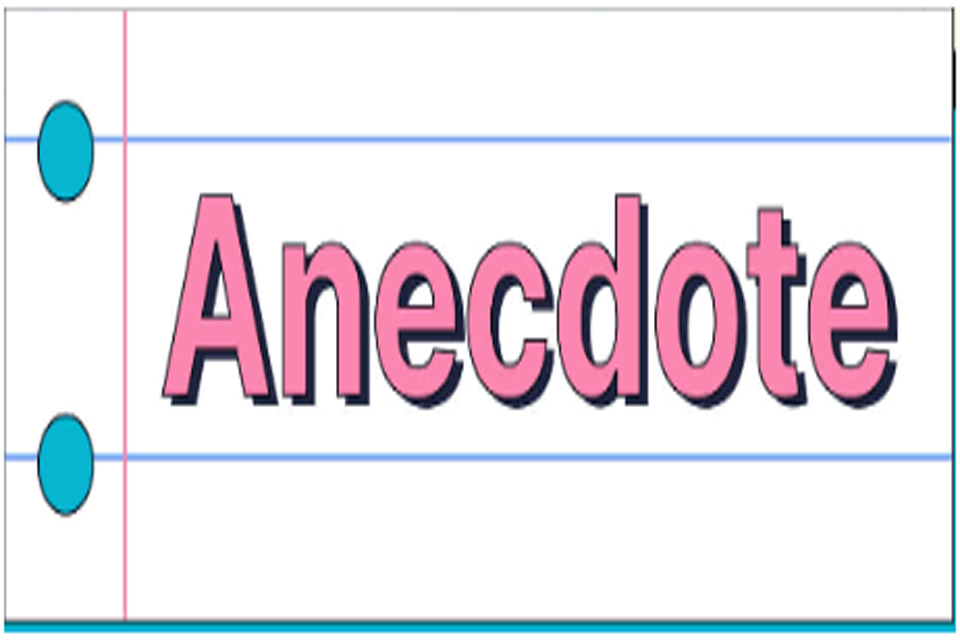Guide to writing an anecdote by understanding anecdote literary definition

Question:Can you explain the anecdote literary definition? What are the types of anecdotes? Can you write an assignment based on anecdotes?
Anecdote literary definition
Stories are generally part and parcel of everybody’s life.Stories have helped usevolve, share our values, contemplate our position in the world, and build a connection with other human beings.
Anecdotes are simple stories which we narrate in our daily lives.Anecdotal stories may consist of sharing our childhood memories, sharing information about the workplace with friends, recollecting a crucial lesson learned in school or college, etc.Nevertheless, the anecdote literary definition is different when used as a part of literature work. When used in literature, it has to sound more than just a piece of the amusement.
In this blog, anecdote literary definition, we will take you through the definition of anecdote and teach you how to use it. Then, with some methods and examples, we will make you understand how to compose an anecdote for yourself. Let’s get going.
A quick overview of anecdote
Before going into the details of anecdote literary definition, we can first understand the meaning of anecdote. A story which is short and self-sufficient can be called an anecdote. It is a precise story describing a few events of your life or from others’ lives.Most anecdotes spin around a dominant idea or event without too much detailing.Anecdotes can be fictional or factual, with a tone of harsh warnings to playful jokes.
The objective behind using an anecdote
The main objective behind using an anecdote in conversations or writing is to put forward a personal perspective, establish a point, and make people laugh or ponder over something.But if used in the fiction of nonfiction writing as a literary device, it has a deeper purpose and a different anecdote literary definition. For example, particular anecdotes explain to a protagonist so that it doesn’t fit the critical description of the plot. Still, the readers get a complete understanding of the motive behind the anecdote. Anecdotes can be used to fill the gaps in a storyline, or they can be used to slow the pace of the storyline.
Certain anecdotes take the help of the language or the rhetoric used to describe them.For example, a light-hearted anecdote can use expletives or rebuke others to make it more interesting and joyful. In contrast, an inspirational anecdote can use emotional words and language to register a note in the reader’s mind.
With this attitude, anecdotes and rhetoric work conjointly for the same purpose based on the type of anecdote.
Types of anecdote literary definition
The anecdote literary definition depends upon the kinds of anecdotes. The common types of anecdotes are:
Cautionary: Stories that teach a lesson take support of anecdotes. They are a good medium to bring back the readers’ attention and focus within a short time. However, cautionary anecdotes frequently have well-built characters with peculiar flaws or imprudence, leading to penalization or adverse consequences.
Humorous:When anecdotes are used to cheer up the mood of the readers or the listeners after a dramatic plot, it is known as humorous anecdotes. These anecdotes are literary devices used to give a quick break from the main plot.
Inspirational: Inspirational anecdotes tend to bring out the feelings of the readers. It is widely used in persuasive and emotional writing.The anecdote uses dramatic events from everyday life, which can help connect with the readers. Hearing such anecdotes makes readers believe that something of that sort has happened to them on a previous occasion.
Reminiscent: Reminiscent anecdotes take the help of past events. The literary device tends to create a nostalgic feeling among the readers. The readers try to relate their past with this version of the anecdote.
How to compose an anecdote?
Are you perplexed after reading the anecdote literary definition? Are you thinking about how to include an anecdote in your writing? Before including any type of anecdote in your writing, ensure that the content of the anecdote you consider adding is relevant. For example, if your writing is about cats and you include an anecdote related to bears, then it is irrelevant to the context.
Ask a set of questions to yourself before including anecdotes in your writing, such as why using an anecdote will help build your content or which points you can illustrate by using an anecdote, who was affected by the story, what occurred, is relevant, where did it occur, etc.
• Structure the anecdote like a story despite its length
• Present the story, establish what happened and try to draw a conclusion or raise a question which can make the readers find the conclusion
• Avoid disclosing the key point of the anecdote at the start of the narration, first mention the person involved
• Refrain from facts that have no connection with the main story
• Move on to explaining the vital context when you have mentioned about people involved
• Write the events in a sequence
• In the end, make your conclusion or raise a question to the readers and make them conclude.
How to utilize anecdotes in writing?
In no way are anecdotes crucial to writing, so don’t force yourself to include one. But, at the same time, anecdotes, in certain instances, can be an out-of-the-way weapon to fulfil your goal.
Primarily anecdotes are effective when trying to depart from the central theme. However, at times writers feel the need to go off-track and tell something that does not suit the central idea of the plot, like supplementary or secondary information.Nevertheless, anecdotes are not directly linked to the main plot, so be careful while using them to unfold vital details.
Anecdotes can pause the narrative and give a break to the readers from continuous reading.Using anecdotes, writers can differentiate the parts of the writing more smoothly than chapter breaks which directly interrupt the writing. In addition, anecdotes provide a natural transition from one idea to another.
Usually, writers do not prefer using facts and figures to communicate their points or use complex writing tricks to prove their points; instead, they choose relevant anecdotes.By utilizing anecdotes, writers get into our surroundings and make their point easily, which could have been otherwise stagnant and dull information.
Last thoughts
Now that you have manifested the anecdote literary definition and the guidelines for using it, you will build a great anecdote unknowingly.You can build the anecdote in your head, and within seconds you will find yourself telling one to your readers or listeners.
Before you understand that you require an idea for the plot, your imagination will make a story for you.In your mind, you will devise a framework that supports and values the idea, select an engaging and thrilling place to begin, select vital information to put the points across and choose a clear ending.
Anecdotal accounts may not be admissible in a court as evidence, but when it is about telling a story to the readers, it can outshine every human story.After having clarity on the anecdote literary definition, if you still feel it challenging to write an anecdote for your story writing task, you can ask for guidance from the writers at TotalAssignment.com. TotalAssignment.com is a stalwart in providing online academic writing services to students from all levels.Our team of writers is well-experienced and highly qualified assignment helpers who put in their 100 per cent effort to meet the student’s expectations and the assignment specification. You can reach out to us at our website.
FAQs
What is a meeting agenda and how to write a meeting agenda?
What will happen during a meeting is outlined in the agenda. The following should be included when you are considering how to write a meeting agenda:
How to write a meeting agenda, including essential items?
The following should be on a meeting agenda:
When to use a meeting agenda?
Every meeting—or at the very least official ones—should have an agenda. A meeting agenda is useful if you want to save time, be on the right track, or achieve a certain goal.
When to use a meeting agenda?
Every meeting—or at the very least official ones—should have an agenda. A meeting agenda is useful if you want to save time, be on the right track, or achieve a certain goal.
When to use a meeting agenda?
Every meeting—or at the very least official ones—should have an agenda. A meeting agenda is useful if you want to save time, be on the right track, or achieve a certain goal.
Total Assignment Help
Incase, you are looking for an opportunity to work from home and earn big money. TotalAssignmenthelp Affiliate program is the best choice for you.
Do visit :https://www.totalassignment.com/affiliate-program for more details
Total Assignment help is an assignment help Online service available in 9 countries. Our local operations span across Australia, US, UK, South east Asia and the Middle East. With extensive experience in academic writing, Total assignment help has a strong track record delivering quality writing at a nominal price that meet the unique needs of students in our local markets.
We have specialized network of highly trained writers, who can provide best possible assignment help solution for all your needs. Next time you are looking for assignment help, make sure to give us a try.
Looking for Assignment Help from Top Experts ?
Get the best Assignment Help from leading experts from the field of academics with assured onetime, 100% plagiarism free and top Quality delivery.


